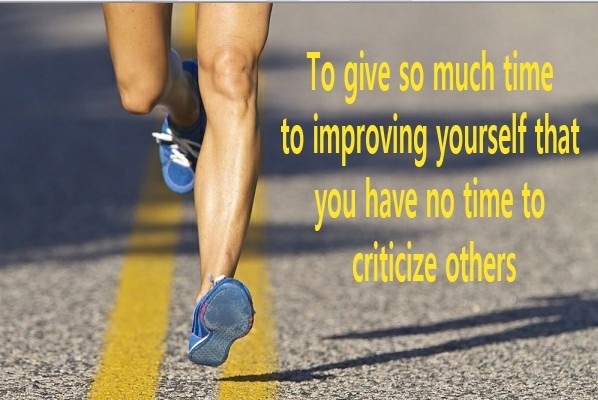10 Ways to Improve Your Happiness by Changing Your Vocabulary.
| |
|
|
7. Impossible “It’s impossible for me to be a professional athlete; I’m just naturally clumsy.” You know what? I’ve seen a one-legged man compete in a Dance Dance Revolution tournament — and win. Nothing is impossible, it just takes time, practice, and dedication. Talent is completely irrelevant in the face of determination. How about “It’s possible for me to be a professional athlete if I want to put in the time and effort.”
8. Never “I could never sing as well as her.” Again, you probably could. Even if today, the sound of you singing in the shower sends birds spiraling disoriented into the ground, that’s just today. You can improve, you can get better, and you can keep getting better for as long as you want to. She probably took hours and hours of voice lessons, so you’re not being fair to yourself. “I could sing as well as her or better if I put my mind to it.”
9. Smack In addition to limiting words, violent words can bring unnecessary negativity into your life. “I’m gonna smack you if you don’t shut up right now!” If that’s really true, then that’s cool, you’re speaking authentically. But I found myself saying this when what I really meant was, “I’m feeling upset and frustrated because I can’t concentrate with a lot of noise around. Could you please be quiet? I’d really appreciate it.” When I rephrased my vocabulary this way, the people around me felt a lot more considered and respected.
10. Kill Now this one I hope you’re not saying with authenticity. “I’m going to kill you if you leave the toilet seat up one more time!” That’s one way to express anger and frustration, but how about expressing it directly instead? “I feel angry and hurt when you leave the toilet seat up, because it seems inconsiderate to me, like you don’t care about my comfort or our shared space.” The “kill” phrasing is likely to lead to an argument, but the “I feel” phrasing is likely to lead to a conversation that might make things better.
These are just 10 of the many words you can rephrase to improve your life. It’s even easier and more fun with a partner. Pick a word that you’d like to rephrase, and ask your partner to let you know whenever you use that word. It can be challenging, but it’s also incredibly rewarding!
News&Opinion
 more
more- The Number of Foreign Students in China
- Time Chinese Women Realize They are Truly Beauti...
- Preparatory Meeting of “Guangzhou University Cit...
- In China, English Teaching is a Whites-only Club...
- Confucius Institute Brings Better Life to Nepalis
- 5-year-old Chinese Girl Was Thrown into a Swimmi...
- A Friendship Bridge Jointly Built by University...
- Ocean University of China in Qingdao Held the Ch...
Policy&Laws
Regulations on Academic Degrees of the People’s ...
Regulations on Academic Degrees of the People’s Republic of China ...
Cross-Straits Business Plan Contest Held at Zhej...
On July 4th, more than a hundred students from 13 universities cross...
Interim Regulations for Admiinistration and Esta...
Article 1 These Regulations are formulated with a view to providing ...





 print
print  email
email  Favorite
Favorite  Transtlate
Transtlate 








